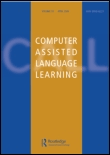
Computer Assisted Language Learning
Scope & Guideline
Connecting Technology and Linguistics for Enhanced Learning
Introduction
Aims and Scopes
- Technology-Enhanced Language Learning:
The journal emphasizes research on how technology, including mobile applications, online platforms, and virtual reality, can enhance language learning outcomes and experiences. - Artificial Intelligence and Language Learning:
A significant focus is placed on the application of AI, such as automated feedback systems and chatbots, to support language learning, improve writing skills, and facilitate learner engagement. - Digital Multimodal Composing:
Research often explores the role of digital tools in multimodal composing, allowing learners to express language skills through various formats, including text, video, and audio. - Informal Digital Learning:
The journal examines informal learning contexts, such as social media and gaming, and their impact on language acquisition, highlighting the role of learner autonomy and motivation. - Collaborative Learning Environments:
CALL promotes research on collaborative learning facilitated by technology, including telecollaboration and peer feedback mechanisms, to enhance interaction and language proficiency. - Assessment and Feedback Mechanisms:
Research on the effectiveness of various assessment methods, including dynamic assessment and automated feedback, is a core area, focusing on how these tools can improve learner outcomes.
Trending and Emerging
- Gamification in Language Learning:
Gamification is increasingly recognized as a powerful tool for enhancing learner engagement and motivation, with research exploring its effectiveness in various language learning contexts. - Integration of Large Language Models:
The application of large language models, such as those used in AI-driven writing assistance, is gaining traction, reflecting a trend towards leveraging advanced technology for improving language skills. - Virtual Reality and Immersive Learning Experiences:
Research on virtual reality (VR) as a means to create immersive language learning experiences is emerging, highlighting its potential to enhance engagement and contextual understanding. - Informal Learning through Digital Media:
The exploration of informal learning environments, particularly through social media and digital gaming, is becoming a prominent theme, emphasizing learner autonomy and motivation in language acquisition. - Emotional and Psychological Aspects of Learning:
There is a growing interest in understanding the emotional and psychological factors that affect language learning outcomes, particularly in digital contexts, addressing learner anxiety and motivation. - Data-Driven Learning and Feedback:
Research focusing on data-driven approaches to learning and feedback mechanisms is on the rise, with studies investigating how data analytics can inform and improve language instruction.
Declining or Waning
- Traditional Language Teaching Methods:
As technology continues to evolve, traditional methods of language instruction, such as grammar-translation and rote memorization, are receiving less attention in favor of more interactive and technology-integrated approaches. - Face-to-Face Interaction in Language Learning:
The shift towards online and hybrid learning environments has led to a decrease in research focused solely on face-to-face interactions, as studies increasingly explore technology-mediated communication. - Static Assessment Tools:
There is a noticeable decline in research centered on static assessment tools, as dynamic assessment and formative feedback mechanisms gain traction due to their effectiveness in supporting learning. - Single-Modal Learning Approaches:
Research emphasizing single-modal approaches, such as traditional reading or listening exercises without integration of multimedia or interactive elements, has become less prominent as multimodal learning gains importance. - General Educational Technology without Language Focus:
While educational technology remains a vast field, specific studies on generic technology applications without a direct connection to language learning are becoming less frequent in CALL.
Similar Journals
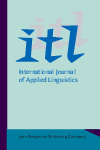
ITL-International Journal of Applied Linguistics
Innovating the future of language studies through rigorous scholarship.ITL-International Journal of Applied Linguistics, published by JOHN BENJAMINS PUBLISHING CO in Belgium, stands as a leading journal in the field of applied linguistics and education, recognized for its rigorous scholarship and impactful contributions. With an impressive ranking of Q1 in both the Education and Linguistics and Language categories, ITL holds its place among the top journals globally, featuring in the Scopus rankings with a notable 91st percentile in both Arts and Humanities as well as Social Sciences. The journal aims to disseminate innovative research exploring the intersection of linguistics, language acquisition, and pedagogical practices, fostering a rich academic dialogue among researchers, educators, and practitioners. Though not currently an open access journal, ITL remains accessible to a broad readership, with an emphasis on high-quality, peer-reviewed articles that inform and inspire advancements in applied linguistics. The journal's commitment to academic excellence and relevance makes it an essential resource for those seeking to understand and contribute to the dynamic landscape of language studies.

TESL Canada Journal
Uniting Scholars and Practitioners for Language Learning SuccessTESL Canada Journal, published by TESL Canada, serves as a vital resource for researchers, educators, and practitioners in the field of English as a Second Language (ESL) and applied linguistics. With its commitment to advancing scholarship and best practices in language education, this esteemed journal fosters a platform for the dissemination of high-quality research and innovative pedagogical approaches. Although it operates without open access, its comprehensive articles and reviews offer valuable insights into current trends and challenges faced by ESL educators across Canada and internationally. The journal is dedicated to promoting a deeper understanding of language acquisition processes and instructional methodologies, contributing significantly to the professional development of its readership. Located in Burnaby, Canada, the journal aims to bridge the gap between theory and practice, making it an indispensable source for educators and researchers looking to enhance their expertise in ESL education.

Porta Linguarum
Bridging linguistics and education for a brighter tomorrow.Porta Linguarum, published by UNIV GRANADA in Spain, is a pioneering journal dedicated to the fields of linguistics and language studies, with a dual focus on the educational implications and applications within these disciplines. Launched in 2008 and continuing its impactful contributions into 2024, the journal is recognized for its rigorous peer-reviewed articles that address contemporary language issues, pedagogical approaches, and linguistic research, evidenced by its notable rankings in the 2023 Scopus metrics. Porta Linguarum holds a distinguished Q1 classification in Linguistics and Language, alongside a respectable Q3 placement in Education, marking it as a valuable resource for academics and practitioners alike. With an impressive ranking of 231 out of 1088 in the Arts and Humanities category and a strong 78th percentile ranking for Language and Linguistics, this journal facilitates the exchange of innovative ideas and promotes scholarly discourse. Although currently not adopting an open access model, it remains an essential platform for advancing knowledge in linguistics and education.

Journal of Technology and Chinese Language Teaching
Advancing Chinese Language Teaching Through InnovationJournal of Technology and Chinese Language Teaching, published by JOURNAL TECHNOLOGY & CHINESE LANGUAGE TEACHING, serves as an influential platform for scholars and practitioners in the intersecting fields of technology, language education, and linguistic research. With an ISSN of 1949-260X, this journal strives to disseminate cutting-edge research and innovative practices aimed at enhancing the teaching and learning of Chinese language through technological advancements. Operated from the United States, it currently occupies valuable quartiles within its categories, showcasing its significance—ranking Q4 in Computer Science Applications, Q3 in Education, and Q2 in Linguistics and Language. As it spans from 2019 to 2024, the journal provides a rich repository for international contributions, fostering a collaborative environment for educators, researchers, and students alike. With both Scopus and HIndex metrics reflecting a solid reputation, the Journal of Technology and Chinese Language Teaching is pivotal for those keen on pushing the boundaries of language instruction in the digital age.
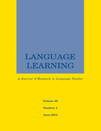
LANGUAGE LEARNING
Charting new territories in language acquisition.LANGUAGE LEARNING is a premier academic journal dedicated to advancing the field of language acquisition and education, published by Wiley. With a foundation dating back to 1948, the journal has carved an esteemed niche in the academic landscape, currently holding a prestigious Q1 rank in both the categories of Education and Linguistics and Language. It proudly occupies the 9th percentile rank in the Arts and Humanities domain and the 10th percentile in Social Sciences, illustrating its influence and reach. The journal publishes high-quality research that explores various dimensions of language learning, from cognitive processes to pedagogical approaches, making it an essential resource for researchers, educators, and students alike. Although Access options are non-open, the journal remains accessible to a wide audience, reinforcing its commitment to disseminating critical insights within the academic community.

Journal of Asia TEFL
Fostering Scholarly Dialogue in Asian Language TeachingWelcome to the Journal of Asia TEFL, a leading peer-reviewed platform dedicated to exploring the intersections of English language education, linguistics, and the dynamic educational landscapes of Asian contexts. Published by ASIA TEFL in South Korea, this journal has emerged as a pivotal resource for academia since its inception in 2004, with consistently expanding influence reflected in its Scopus rankings, including a notable 76th percentile in Linguistics and Language. With a focus on the evolving methodologies and pedagogical innovations in English language teaching, the journal aims to foster scholarly discussions that enhance teaching practices and policy-making in a globalized world. Although it currently operates without open access, its rigor and relevance in categories such as Education and Linguistics ensure that it remains a valuable asset for researchers, educators, and students seeking to advance their knowledge and practice within this vital field of study.
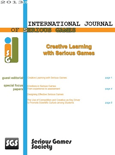
International Journal of Serious Games
Advancing the Frontier of Serious Games ResearchThe International Journal of Serious Games is a pioneering publication dedicated to advancing the interdisciplinary field of serious games and their application in various domains such as education, artificial intelligence, and human-computer interaction. Published by SERIOUS GAMES SOC in Italy, this Open Access journal has been facilitating unrestricted access to innovative research since 2014. The journal is recognized for its quality, achieving prominent rankings in its categories, including Q2 in Education and Q2 in Computer Graphics and Computer-Aided Design as of 2023. With its commitment to academic rigor, it places itself as an essential resource for researchers, professionals, and students seeking to explore the transformative potential of serious games. Housed at the IST INT COMUNICAZIONI, VILLA PIAGGIO, GENOA, the journal continues to foster knowledge sharing and collaboration across disciplines, enriching the global discourse on gaming for impact.
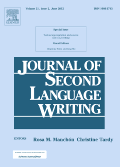
JOURNAL OF SECOND LANGUAGE WRITING
Advancing Research in Language Acquisition and PedagogyJOURNAL OF SECOND LANGUAGE WRITING, an esteemed publication of PERGAMON-ELSEVIER SCIENCE LTD, serves as a pivotal resource in the fields of Education and Linguistics, exhibiting a remarkable impact factor that solidifies its standing in the academic community. Established in 1992, this journal has consistently provided a platform for high-quality research and discourse, with its articles rigorously peer-reviewed to ensure scholarly integrity. Holding Q1 rankings in both Education and Linguistics for 2023, it is recognized for its influence in shaping the field of second language acquisition and pedagogy. With impressive Scopus rankings that place it in the 98th percentile among peers, the journal attracts a diverse readership comprising researchers, educators, and students eager to explore the intricacies of second language writing. Its focus encompasses theoretical research, practical applications, and innovative methodologies that enrich the field, making it an essential resource for those dedicated to understanding and enhancing the writing skills of second language learners.
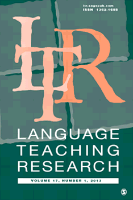
Language Teaching Research
Empowering educators with cutting-edge findings.Language Teaching Research, published by SAGE Publications Ltd, serves as a pivotal platform for scholars and practitioners in the domains of education and linguistics. Since its inception in 1997, this prestigious journal has maintained its status within the Q1 category for both Education and Linguistics, symbolizing its significant impact and commitment to excellence in research. With impressive Scopus rankings placing it among the top percentile in its fields, Language Teaching Research provides a comprehensive array of articles, studies, and reviews dedicated to advancing the theory and practice of language education. Although currently not an Open Access journal, it remains essential reading for those engaged in the evolving challenges and methodologies surrounding language teaching and learning. The journal aims to foster insightful discussions and disseminate innovative research findings, making it a crucial resource for educators, researchers, and students keen on enhancing language acquisition and pedagogical strategies.

Studies in Self-Access Learning Journal
Exploring innovative practices in self-directed learning.Studies in Self-Access Learning Journal is a pioneering academic outlet dedicated to the exploration and advancement of self-access learning practices across diverse educational contexts. Published by Kanda University of International Studies in Japan, this open access journal has been committed to disseminating high-quality research since its inception in 2010, facilitating global access to valuable insights in the fields of Computer Science Applications, Education, and Linguistics and Language. With a significant presence in academic databases, the journal has achieved notable rankings, including Q3 in both Computer Science Applications and Education, and Q2 in Linguistics and Language for 2023. Its emphasis on innovative practices in self-directed learning makes it an essential resource for researchers, educators, and practitioners alike, who are looking to contribute to and benefit from the latest findings in this dynamic area of study. As the journal continues to evolve through its converged years from 2019 to 2024, it remains a vital forum for scholarly dialogue, encouraging multidisciplinary collaborations and enriching the educational landscape.